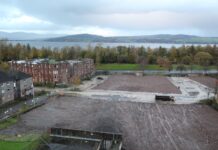
NEW research has revealed that demand for green buildings is on the rise in Scotland.
The findings were highlighted in the Royal Institution of Chartered Surveyors (RICS) sustainability report for 2024. The organisation said that while the UK has made ‘strides’ in carbon reduction across buildings and infrastructure, further action is needed to meet national and global climate goals.
46% of respondents in Scotland reported that occupier demand for green or sustainable buildings has risen in the past year. 41% of respondents stated that they currently do not measure embodied carbon, which is slightly lower than the UK average of 43%.
31% of Scottish respondents cited a lack of government incentives and policy uncertainty as a barrier to the widespread adoption of sustainable practices across the industry. High initial costs of sustainable or green building practices and materials also appears to be a barrier, with 66% reporting this as a challenge for adopting sustainable construction practices.
21% of Scottish respondents stated that they measure biodiversity on all projects, while 65% report that they measure biodiversity only on some projects.
To accelerate progress, RICS advocates for a sustainability approach that includes evidence-based targets, mandatory carbon assessments for all new projects, and enhanced training for built environment professionals. The report also recommends that policymakers set clear, national targets to aid decarbonisation, alongside the enforcement of minimum energy performance standards, building codes, and climate resilience benchmarks.
Norman McLennan, chair of RICS (Scotland) board said, “In Scotland we are making our own positive strides in working towards achieving net zero, but the results of the report point to a lack of carbon measurement, which is instrumental in meeting Scotland’s energy targets. To achieve targets, measurement must become common practice.
“The imminent publication of the Heat in Buildings Strategy Bill, which aims to encourage more homeowners to retrofit their houses using a fabric first approach and employ cleaner heating systems, such as heat pumps and heat networks will allow Scotland to make significant progress towards eliminating these emissions over the next decade.
“As chair of the newly formed RICS net zero, renewable energy and sustainability group, we will work collaboratively to feed into relevant policy areas and encourage professionals to embed net zero carbon targets as industry standard in both decision making and procurement approaches, in order to build a sustainable future for society.
“As a group, we are optimistic that the planned future investment in construction and the built environment will generate substantial multi-discipline opportunities for surveyors across Scotland and our profession in general. Additionally, there will be new opportunities as the UK Government commits to GB Energy and other energy infrastructure investments including onshore and offshore renewable energy projects, hydrogen and carbon capture, especially for those working in land, renewable energy and natural resources, built environment infrastructure and project management.”








